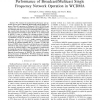Free Online Productivity Tools
i2Speak
i2Symbol
i2OCR
iTex2Img
iWeb2Print
iWeb2Shot
i2Type
iPdf2Split
iPdf2Merge
i2Bopomofo
i2Arabic
i2Style
i2Image
i2PDF
iLatex2Rtf
Sci2ools
103
click to vote
VTC
2008
IEEE
2008
IEEE
On the Impact of Coarse Synchronization on the Performance of Broadcast/Multicast Single Frequency Network Operation in WCDMA
Abstract—We evaluate the system-level performance and potential capacity gain of MBSFN (Multicast/Broadcast Single Frequency Network) operation in Wideband CDMA (WCDMA) and compare it to conventional Multimedia Broadcast/Multicast Service (MBMS) with macro-diversity combining. MBSFN operation has recently been discussed in the standardization bodies of the 3rd Generation Partnership Project (3GPP) as an enhancement to MBMS. It aims to mitigate the cell-edge problem of multicast/broadcast applications, which are typically dimensioned for a predefined coverage. In WCDMA as considered here, MBSFN operation refers to the use of a single common scrambling code and the same set of spreading codes to simultaneously broadcast bit identical MBMS data in a number of cells that form an MBMS cluster. Since inter-cell interference is drastically reduced by this concept (given a downlink resource exclusively reserved for MBMS traffic), it has the potential of considerably increasing the spectral...
Bit Identical Mbms | Communications | MBMS | MBMS Cluster | VTC 2008 |
| Added | 01 Jun 2010 |
| Updated | 01 Jun 2010 |
| Type | Conference |
| Year | 2008 |
| Where | VTC |
| Authors | Christoph A. Jotten, Christian Sgraja, Josef J. Blanz |
Comments (0)

